Mental foramen
| Mental foramen | |
|---|---|
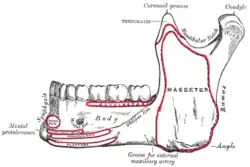 Mandible. Outer surface. Side view. (Mental foramen visible at left.) | |
| Details | |
| Part of | mandible |
| Identifiers | |
| Latin | foramen mentale |
| MeSH | D000080383 |
| TA98 | A02.1.15.007 |
| TA2 | 845 |
| FMA | 53171 |
| Anatomical terms of bone | |
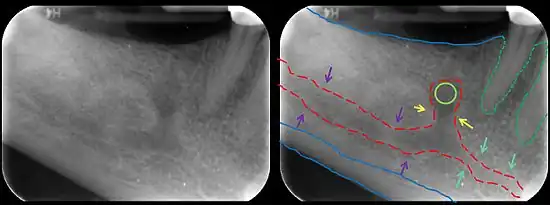
The mental foramen is one of two foramina (openings) located on the anterior surface of the mandible. It is part of the mandibular canal. It transmits the terminal branches of the inferior alveolar nerve and the mental vessels.
Structure
The mental foramen is located on the anterior surface of the mandible. It is directly below the commisure of the lips, and the tendon of depressor labii inferioris muscle.[1] It is at the end of the mandibular canal, which begins at the mandibular foramen on the posterior surface of the mandible. It transmits the terminal branches of the inferior alveolar nerve (the mental nerve),[1] the mental artery, and the mental vein.
Variation
The mental foramen descends slightly in toothless individuals.[2]
The mental foramen is in line with the longitudinal axis of the 2nd premolar in 63% of people.[3] It generally lies at the level of the vestibular fornix and about a finger's breadth above the inferior border of the mandible.
In the general population, 17% of mandibles have an additional mental foramen or foramina on at least one side,[3] while 4% of the mandibles show multiple mental foramina on both sides. Most are unequal in size, often with a single large foramen while any others are smaller.[3] An incisive mental foramen is observed in 1% of the side of the mandible.[3]
Clinical significance
The mental nerve may be anaesthetized as it leaves the mental foramen.[1] This causes loss of sensation to the lower lip and chin on the same side.[1]
Additional images
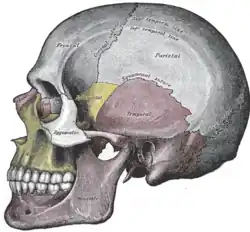 Side view of the skull.
Side view of the skull.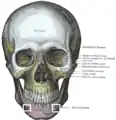 The skull from the front.
The skull from the front.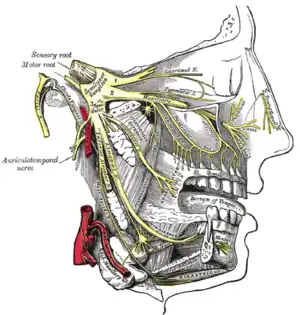 Distribution of the maxillary and mandibular nerves, and the submaxillary ganglion.
Distribution of the maxillary and mandibular nerves, and the submaxillary ganglion.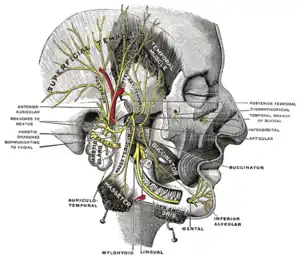 Mandibular division of the trifacial nerve.
Mandibular division of the trifacial nerve.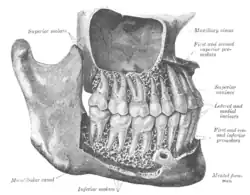 The permanent teeth, viewed from the right.
The permanent teeth, viewed from the right.
See also
References
- 1 2 3 4 Doherty, Tom; Schumacher, James (2011). "15 - Dental restraint and anesthesia". Equine Dentistry (3rd ed.). Saunders. pp. 241–244. doi:10.1016/B978-0-7020-2980-6.00015-5. ISBN 978-0-7020-2980-6.
- ↑ Soikkonen K, Wolf J, Ainamo A, Xie Q (November 1995). "Changes in the position of the mental foramen as a result of alveolar atrophy". Journal of Oral Rehabilitation. 22 (11): 831–3. doi:10.1111/j.1365-2842.1995.tb00230.x. PMID 8558356.
- 1 2 3 4 Jaffar, A. A.; Al-Zubaidi, A. F.; Al-Salihi, A. R. (2002). "Anatomical features of clinical significance in dry mandibles". Iraqi Dental Journal. 29: 99–118.
External links
| Wikimedia Commons has media related to Mental foramen. |
- cranialnerves at The Anatomy Lesson by Wesley Norman (Georgetown University) (V)
- Diagram at uni-mainz.de